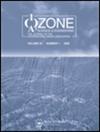Reactive Black 5 Removal with Ozone on Lab-scale and Modeling
IF 1.4
4区 环境科学与生态学
Q3 ENGINEERING, ENVIRONMENTAL
引用次数: 2
Abstract
ABSTRACT This study investigates modeling the ozone removal of the Reactive Black 5 (RB5) dye from an aqueous solution using a combination of nonlinear regression (NLR), multiple linear regression (MLR), and Intrinsically multiple linear regression (IMLR) models. Lack of use and evaluation of the IMLR method in estimating RB5 removal by ozonation attract attention. Experimental data were used in the R Core Team software for the development of the models and estimate of RB5 removal by ozone. The effects of variables such as pH, contact time, initial dye concentration, and applied ozone dosage on RB5 removal by ozone were investigated. Maximum 92% RB5 removal rate was obtained at pH 8, 60 min contact time, 100 mg/L initial RB5 concentration, and applied ozone dosage of 66 mgO3/L. Under these conditions, the amount of specific ozone consumption was 0.678 gO3/gRB5. In order to compare the models, coefficient of determination (R2) and mean square error (MSE) were utilized as reliability and precision criteria. The best R2 and MSE values for the IMLR model were calculated as 0.8940 and 0.098, respectively. To determine the appropriate model and coefficients, analysis of variance (ANOVA), and t-test were used, respectively. Whether the model is within the confidence interval was determined by the significance value (p) and the variation was <5% for the IMLR model. As a result, it was found that the best method for modeling RB5 removal from aqueous solution by ozone was the IMLR method. Detailed explanations on results were introduced in the study.实验室规模臭氧去除活性黑5及模拟
摘要:本研究利用非线性回归(NLR)、多元线性回归(MLR)和本质多元线性回归(IMLR)模型的组合,对水溶液中活性黑5 (RB5)染料的臭氧去除进行了建模。缺乏使用和评价的IMLR方法在估计臭氧氧化去除RB5引起了人们的关注。实验数据在R Core Team软件中用于模型的开发和臭氧去除RB5的估计。考察了pH、接触时间、初始染料浓度、臭氧用量等因素对臭氧去除RB5的影响。当pH为8、接触时间为60 min、RB5初始浓度为100 mg/L、臭氧投加量为66 mgO3/L时,RB5去除率最高达92%。在此条件下,臭氧比耗量为0.678 gO3/gRB5。为了比较模型,采用决定系数(R2)和均方误差(MSE)作为信度和精密度标准。IMLR模型的最佳R2和MSE值分别为0.8940和0.098。为了确定合适的模型和系数,分别采用方差分析(ANOVA)和t检验。模型是否在置信区间内由显著性值(p)决定,IMLR模型的变异<5%。结果表明,模拟臭氧去除水溶液中RB5的最佳方法是IMLR方法。对研究结果进行了详细的解释。
本文章由计算机程序翻译,如有差异,请以英文原文为准。
求助全文
约1分钟内获得全文
求助全文
来源期刊

Ozone: Science & Engineering
环境科学-工程:环境
CiteScore
5.90
自引率
11.10%
发文量
40
审稿时长
2 months
期刊介绍:
The only journal in the world that focuses on the technologies of ozone and related oxidation technologies, Ozone: Science and Engineering brings you quality original research, review papers, research notes, and case histories in each issue. Get the most up-to date results of basic, applied, and engineered research including:
-Ozone generation and contacting-
Treatment of drinking water-
Analysis of ozone in gases and liquids-
Treatment of wastewater and hazardous waste-
Advanced oxidation processes-
Treatment of emerging contaminants-
Agri-Food applications-
Process control of ozone systems-
New applications for ozone (e.g. laundry applications, semiconductor applications)-
Chemical synthesis.
All submitted manuscripts are subject to initial appraisal by the Editor, and, if found suitable for further consideration, to peer review by independent, anonymous expert referees.
 求助内容:
求助内容: 应助结果提醒方式:
应助结果提醒方式:


